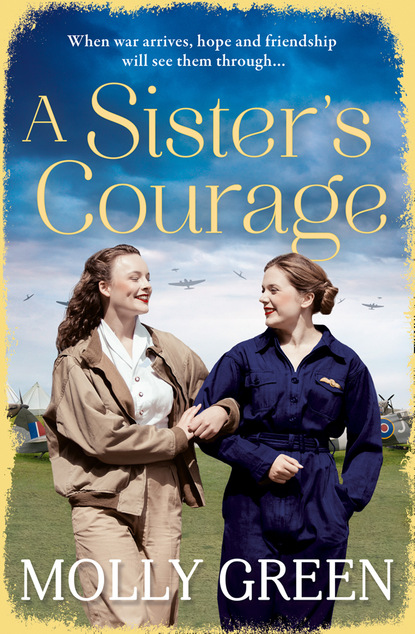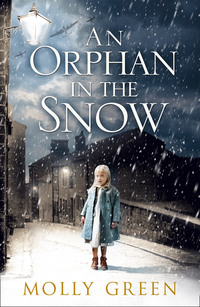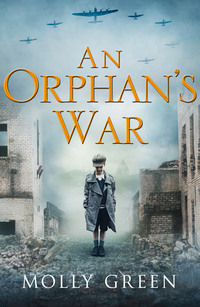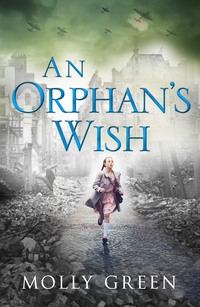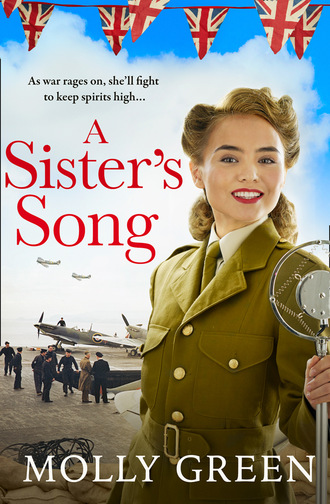
Полная версия
A Sister’s Song
‘But, Maman, they’ll put him down,’ Ronnie said, tears springing to her eyes. ‘I saw a government leaflet in the library that said it’s the kindest thing to do to dogs and cats now we’re at war, even if they’re already people’s pets. A vet had to put a dog down the other day that was only two years old. The owner forced him.’ She looked pleadingly at Maman, and Suzanne’s heart leapt to her throat. ‘It’s not being kind, it’s cruel to put perfectly good animals down.’ Ronnie gently patted the dog’s head. ‘He’s a living being – just the same as us. And he’d only need scraps. Please give him a chance. He deserves it.’
‘Non,’ Simone said. ‘The dog must go. And they are my final words.’
Suzanne braced herself to speak to Maman on her own after supper, so when Ronnie had sneaked Rusty upstairs, Suzanne tackled her.
‘Maman, I must talk to you about Ronnie,’ Suzanne said, as she collected the dirty plates to take into the kitchen.
‘Do you not mean about the dog?’ Simone said shrewdly.
Suzanne’s cheeks turned pink. ‘Well, yes, I suppose so,’ she conceded. She took in a breath to steady her voice. ‘Maman, I do think you could bend on this occasion. Ronnie hasn’t been herself since Dad died, and she’s crazy about animals. She’s always the one who comes to the rescue of any animal or bird who needs it. She’s an example to all of us. We should all be willing to help the underdog.’
‘That is a good description for that stray,’ Simone flashed.
‘It would give her something of her own,’ Suzanne said, ignoring the jibe. ‘Being the youngest, she’s always felt left out.’
‘Nonsense.’
‘It’s true,’ Suzanne returned, ‘but she covers it up.’
Maman pursed her lips.
‘She’s asked you for a dog so many times and you always say no. When Dad was alive I even heard him say you should allow her to have a dog.’
‘And how does she feed him and walk him when she is at school?’
Was Maman softening?
Suzanne took the plunge. ‘She can take him for an early walk and feed him before she goes to school. And I’ll help out as well when I come home.’
‘And what happens to him during the day?’ Simone challenged. ‘I am doing my bit for the war effort … although no one gives me any credit,’ she added. ‘I cannot be here all the time. If he is left alone he will destroy my last good pieces of furniture.’
‘We can put a cardboard box in the shed, and plenty of water. He’ll have to just wait for Ronnie and me to come home from school.’ She looked at her mother. ‘Please, Maman.’
‘I am sorry, Suzanne. It is completely out of the question. But one thing …’ She gazed at Suzanne. ‘I have also not been myself since your father died. But all of you seem to forget that.’
‘No, Maman, we never forget,’ Suzanne said quickly. ‘But Raine has her flying, and I have my music. It’s important that Ronnie has something precious of her own as well. Something to care for, to take responsibility. It will do her the world of good. So why can’t it be Rusty?’
Suzanne bounded up the stairs and knocked on Ronnie’s bedroom door.
‘Shhhh, Rusty,’ she heard Ronnie say.
Ronnie came to the door, Rusty in her arms. He wagged his tail, his eyes fixed on Suzanne.
Ronnie looked at her face. ‘Oh, Suzy, did Maman say I could keep him?’
‘Not exactly,’ Suzanne said, ‘but he’s been given a short reprieve. She said he could stay for one week, but only if he doesn’t disturb the neighbours with barking. And he cannot come anywhere in the house except your bedroom. If you want to put up with the fleas, it’s up to you, Maman said. She also said that one of us has to be with him when he’s indoors to keep him under control. In other words, you can’t leave him in your bedroom all day. And you must put a notice in the post office and the village shop to ask if anyone has lost him. You’ve got to do that right away.’
Ronnie’s face fell. ‘What if no one claims him? Did Maman say I’d have to take him to the vet to be put down?’
‘She didn’t say,’ Suzanne said, ‘but it gives him a week to get him used to us and learn his manners.’ She gently patted Rusty’s head. ‘He’ll feel better with some regular food inside him. I’m sure we can spare a small piece of soap to give him a bath tomorrow so he doesn’t smell—’
‘He doesn’t smell,’ Ronnie cut in.
‘He does a little,’ Suzanne grinned. ‘But he won’t by the time we’ve finished with him. Then maybe he might win round Maman.’
Ronnie broke into a beam. ‘Oh, Suzy, you are wonderful. Only you could persuade her. But I knew you would.’
‘Don’t get too carried away, Ronnie,’ Suzanne said, allowing Rusty to give her hand a lick. ‘Rusty’s not safe yet. But we’ll do everything we can to see that he stays – unless someone claims him first, of course.’ She glanced down at the dog who was looking up at her as though he knew his fate was in her hands. ‘Though I can’t see a queue of people fighting over him,’ she laughed.
Chapter Two
‘I have received a letter from your music teacher,’ Simone told Suzanne a few days later when she came home from school and they were having tea in the dining room.
What on earth was Miss Reeves writing to Maman about?
‘It is serious,’ Maman said, ‘so I will read it to you.’ She unfolded a sheet of paper.
‘Dear Mrs Linfoot,
‘I am writing to you regarding your daughter, Suzanne. I am sure you are aware that she is a very talented musician, both as a violinist and also a pianist, and I believe she has the potential to develop her talent much further. Yesterday I had a telephone conversation with Mr Rubenstein. He said her solo performance in the village hall recently was truly exceptional for such a young girl (I’m afraid I couldn’t attend owing to family sickness) and has suggested she should attend the Royal Academy of Music in London, full-time, starting this September.
‘If Mr Rubenstein recommends Suzanne and she is accepted, this is such a wonderful opportunity. I have already spoken to Miss Robson, the headmistress, and she has given her whole-hearted approval if Suzanne takes what could be a life-changing opportunity.
‘But before we go any further, we would obviously like to know your thoughts. If you would both like to come in and see me next week, I would be happy to discuss this further.’
Suzanne’s heart beat fast. This was so unexpected. She’d had no idea Mr Rubenstein had found her performance exceptional in any way. It had once been her dream to be accepted into a prestigious music school and one day take her place in the London Philharmonic Orchestra. But Miss Reeves had dashed her hopes when she said in a matter-of-fact tone that women were rarely accepted in a professional orchestra.
‘Unless you play the harp,’ Miss Reeves said, her glasses practically falling off her nose. ‘And even then, you wouldn’t be seen by the audience – your place would be well and truly in the wings.’ The tutor grimaced. ‘You wouldn’t even be acknowledged on the programme.’
‘That’s so unfair,’ Suzanne blurted.
‘I’m afraid you’ll find that life’s unfair,’ Miss Reeves said, a slightly bitter edge to her voice as she pushed her glasses back into position.
At the time, Suzanne had been bitterly disappointed, another dream in ashes. Why on earth should she learn the harp? What a ridiculous rule it was, but she’d had to accept it.
Simone looked up from the letter. ‘So, chérie, what do you say?’
Suzanne’s thoughts flew in different directions. Maman impatiently tapped her foot.
‘You were always very firm about me taking my Higher Certificate,’ Suzanne said, playing for time.
‘Because Lorraine let the family down by leaving school before her final year,’ Simone said. ‘She would not listen to me. She does not stop to think how I worry about her constantly, flying those dangerous contraptions that girls should not be allowed to operate. But this letter, Suzanne—’ she waved it in the air ‘—it changes everything. You will have wonderful training for a music career. Something to be proud of.’
‘Well, I’m proud of Raine,’ Suzanne returned. ‘She’s doing something very worthwhile. She’s directly helping the war effort.’
‘Music is worthwhile, also,’ Simone said sharply, her cup clattering onto its saucer.
‘Yes, I agree. But it’s not that simple.’ Suzanne regarded her mother. ‘Did you know it’s almost unheard of for a woman to be accepted in professional orchestras?’
‘What nonsense,’ Simone retorted. ‘You play as well as any man. If not, why did this Mr Rubenstein make this suggestion?’
‘Maybe he thinks I’d be a good teacher … but that’s not what I want.’ Suzanne paused. ‘So you really are in favour of me leaving school?’
A dreamy smile broke out on her mother’s face. ‘My daughter at a London conservatoire. Nearly so good as the one in Paris.’
‘I’d like to think about it,’ Suzanne said. ‘It’s a big decision.’
‘Mais bien sûr,’ Simone said, getting up and kissing her cheek. ‘But you will answer me “yes”, will you not? And then one day everyone will know your name.’
Suzanne could tell her mother was excited about the prospect of her daughter becoming famous, but fame was not Suzanne’s idea of happiness. She would rather be known for bringing joy to people, especially where there was precious little. And because the country was in the middle of a war, she desperately wanted to help make a difference, however small. But what could she do?
‘I’ll think about it, Maman,’ she repeated.
Her mother frowned. ‘Do not be long thinking,’ she said. ‘The opportunity might not always be there for you. And you will only have yourself to blame.’
Maman couldn’t have made herself any clearer.
If only Raine was here, Suzanne thought, as she changed the sheets on her bed, top to bottom, then smoothed a fresh one on the top as she did every fortnight. Raine would understand. Her sister had had a terrible time defying Maman but she’d won in the end. Raine was the strong one. She’d sent Suzanne a letter wishing her good luck for the concert and she was sorry to miss it but the ferry pool was going full pelt. She mentioned she’d just completed the third twelve-hour day in a row. Suzanne smiled to herself. This wasn’t a grumble from her older sister. She knew Raine adored her work as a ferry pilot as much as she loved playing her instruments.
The trouble was, unlike Raine, Suzanne found it hard to stand up to her mother. Dad had lost so much money not long before he died, which put the family in a difficult situation, but her mother had still managed to continue to pay for one of the best music tutors in Bromley, funding the extra violin lessons from her own nest egg.
It was the war. This was what changed everything. It wasn’t so bad at the moment while she was still at school, but she’d be taking her final exams this June. Some of her friends had already left school at sixteen and seventeen to work in munitions factories or hospitals, or join one of the forces, determined to do their bit for the war effort, whereas she, at eighteen, hadn’t planned anything.
She couldn’t help feeling guilty but she knew she didn’t have the kind of grit one needed to join the military. All that marching to bellowed orders from her superiors, shrieking at her when she made a mistake or had left a button undone or scuffed a shoe, made her tremble with anxiety. Conscription had recently come in for single women between twenty and thirty, but that could change at any time.
‘Come and join the WRNS with me, Suzy,’ her friend Rita had said a few weeks ago. ‘It’ll be fun being together and you could probably play in the band in your spare time.’ She regarded Suzanne with a worried frown. ‘Thing is, you’ll be twenty before you know it and then they might choose for you, and you’ll probably be made to join the ATS … and their uniform isn’t half as smart as the Wrens’,’ she added slyly.
‘But I’ve never learnt to play any of the brass instruments,’ Suzanne protested. She didn’t add that playing in a military band had no appeal.
‘With your talent you’d soon learn,’ Rita came back quick as a flash.
The trouble was, if she had to learn another instrument from the beginning she’d be neglecting her violin practice. Her violin that she loved as an extension of herself. And she definitely wouldn’t have any spare leisure time to play the piano. She’d never hear the last of it from Maman. And she wouldn’t blame her.
‘I’ll think about it,’ Suzanne had told Rita.
But she knew she wouldn’t. There had to be another way of helping the war effort. There just had to be.
And now this. Her mother wanted her – no, she’d more or less ordered her – to go to London to study music. No doubt it would be for at least three years. Her old dream come true, but she’d be protected from the outside world, and wouldn’t be helping the war effort. But what choice did she have?
Suzanne sighed as she plumped the pillow and folded her nightdress, tucking it inside its cover that she’d embroidered in sewing class. It wasn’t a foregone conclusion that she would even be accepted at the music school, but she owed it to her mother to try. Maman loved classical music but had never learned to play an instrument, saying she had no aptitude, so she was putting all her dreams into her talented daughter, as she often freely admitted. Suzanne shrugged. Maybe a miracle would happen and the war would end soon and she could go off to London with a glad heart. Although watching Pathé News at the cinema last week when she and Rita had gone to see Sally Gray in Dangerous Moonlight, she wasn’t at all convinced it was about to happen.
‘Suzanne!’ Her mother’s call broke into her thoughts.
‘Yes, Maman?’
‘I have made coffee. Véronique has gone to the library with that dog, so we can talk without being disturbed.’
Suzanne’s heart sank. Maman would expect an answer, but only the answer she insisted upon. With a sigh she turned and slowly walked out of the bedroom and down the staircase where her mother was waiting for her.
‘Well, Suzanne?’
‘I will go to London, Maman, if you think it is the right thing for me to do, even with a war on.’
‘I, and many others, it seems.’ Simone’s face lit up. ‘It is a very sensible decision. You must not waste your gift – even with the war. I will telephone Miss Reeves tomorrow morning to discuss the next step.’
‘Everyone’s talking as though I’ve already been offered a place,’ Suzanne said. ‘I’d have to do an audition first before they accept me.’
‘You will do it standing on top of your head,’ Simone said.
‘I hope it doesn’t come to that.’ Suzanne gave a wry smile.
She was glad she’d made her mother happy, but there was still that niggling doubt in her mind.
‘I see,’ Suzanne heard her mother say into the receiver. ‘Well, it is most inconvenient, but I suppose it cannot be helped.’ Her mother tilted her head. ‘No, thank you, Miss Reeves is the lady I must talk to.’ Simone put her hand over the mouthpiece. ‘Miss Reeves is away,’ she muttered to Suzanne who was putting her coat on to go to her rehearsal. Her mother removed her hand and spoke to whoever it was on the other end. ‘When she is returned, would you please ask her to telephone me?’
There was a minute’s pause while her mother listened, then rolled her eyes to the ceiling.
‘Yes, yes, I understand. The Easter holidays. Maybe a delay. Thank you.’ Simone slammed the receiver down and swept into the dining room.
‘That was Miss Robson, your headmistress,’ she said. ‘Miss Reeves is still attending to the sick family member. They do not know when she is coming back.’
Her mother would be even more annoyed if she suspected the flicker of relief in her middle daughter’s heart, Suzanne thought, as she shut the front door behind her and briskly walked to St Mary’s Church for the rehearsal.
As usual, the sight of the pretty flint-built parish church with its stained-glass windows lifted her spirits. She thought of Charles Darwin’s family attending the Sunday service so many years ago. People had gone before her and people would go after her, but this was today and it was her turn to appreciate its special ambience.
She heard the others tuning their instruments before she’d heaved open the heavy oak door. She smiled. Although she was happy playing set pieces in her bedroom when no one was around, it was wonderful to be with other musicians. They could tackle different pieces when they were together. That was when she felt part of a real orchestra even though it was only a fraction of the size.
She stepped inside and looked round to see who was there and spotted Mr Rubenstein neatly folding his coat like a parcel and leaving it on one of the chairs. Four men and four women had already assembled.
It’s lovely to know our little group isn’t bound by the stiff regulations of professional orchestras, Suzanne thought, as she smiled and nodded to everyone.
All the men were older, most of them having already played their part as soldiers in the Great War and now finding comfort in music. Mr Barton had a missing leg but it didn’t stop him from being a superb cellist. Three women were in their fifties or even sixties, and only Wendy was younger – maybe in her mid-twenties – much too young to be a widow.
The smell of the interior was comforting – a mix of candles and old books and furniture polish. Very little warmth escaped from the two paraffin stoves; any heat they managed to produce rose straight up to the high oak-beamed ceiling. Yet however cold she was before she began, once she started playing, all discomforts evaporated and she was totally absorbed.
The conductor was now turning over his sheets of music, frowning. She wondered if she should say anything in front of the others to thank him for recommending her to attend the Royal Academy of Music. Maybe best not to. It might look like favouritism, or that she was bragging. She’d have a word after the rehearsal if she could get him on his own.
The rehearsal was not one of their best. Suzanne found it difficult to concentrate, and more than once she didn’t come in on perfect time. Mr Rubenstein said nothing but raised his eyebrows in question. Some of the others stumbled with their pieces, which was unusual as they’d played Dvorak’s ‘Slavonic Dances’ several times before.
‘We’ll have a tea break,’ Mr Rubenstein said a half an hour later, putting down his baton. ‘Maybe that will buck you all up.’
‘Tea’s all ready, sir.’ Mrs Jackson, one of the volunteers, bustled through from the kitchen. ‘And there’s some nice ginger cake Mrs Henry made this morning especially for you all.’
While the group were chatting together and enjoying Mrs Henry’s cake, Wendy lightly touched her arm.
‘I need to talk to you about something, Suzanne,’ she said, her green eyes gleaming. ‘Bring your tea over to one of the tables.’
When they’d settled on the hard chairs, Wendy leaned forward.
‘I didn’t want to mention it until it was definite, but I’ve heard now that I’m in,’ she said in a conspiratorial whisper.
‘In what?’ Suzanne found herself whispering back.
‘I’ve joined ENSA.’ Wendy waited to let her words sink in. ‘I’m just waiting to hear when I actually start.’
Suzanne shook her head. ‘I don’t know what you’re talking about,’ she said. ‘What’s Ensa?’
‘E-N-S-A,’ Wendy spelt it out. ‘Capital letters. It’s an organisation they set up at the beginning of the war to entertain the troops. They go all over the place, sometimes even abroad – wherever the fighting boys are – like Vera Lynn does. You must have heard of it. They call it “Every Night Something Awful”.’ She giggled. Suzanne realised it was the first time she’d ever seen Wendy so animated.
‘Why would you want to play with them if they’re awful?’
‘It’s not the official name,’ Wendy said, still chuckling. ‘It’s Entertainments National Service Association.’
‘How did you find out about it?’
‘Through The Stage magazine. They were advertising and I thought, why not?’
‘Well, I’ve heard that Vera Lynn sings to the troops,’ Suzanne said, ‘but what’s that got to do with the kind of music you play? Unless you sing as well.’
Wendy’s face flushed with eagerness. ‘Funnily enough, they gave me an audition to sing a few songs as they’d been let down by one of the singers.’ She laughed a little self-consciously. ‘How did they guess it’s something I’ve always fantasised about doing? Anyway, I put my heart and soul in it—’ She stopped and giggled again. ‘Actually, that’s what I sang at the audition – “Heart And Soul” – and they said yes!’ She looked round the room but everyone was chatting and intent on enjoying Mrs Henry’s ginger cake. ‘Oh, Suzanne, I’m so excited – I can’t wait to go.’
Suzanne felt she was being swept away with Wendy’s enthusiasm. Her heart beat a little more quickly.
‘Tell me more about this ENSA.’
‘Well, it’s quite varied. They’ve always had comedians and singers and drama groups – often with famous actors like Jack Hawkins – but they’re big on swing bands.’
Suzanne’s mouth fell open. ‘And you can really sing to that kind of music?’
‘I sing along with the wireless all the time.’ Wendy grinned. ‘Look, why don’t you join up, too? It’d be fun – if you like swing and jazz, that is.’ She took a gulp of tea and sat back, keeping her eyes fixed on Suzanne.
‘Who doesn’t?’ Suzanne said, her heart leaping. Was this the sign she’d been waiting for? She wouldn’t have dreamt of being a jazz violinist in normal times – she could just picture Maman’s face – but these weren’t normal times. She gazed back at Wendy, stupefied.
‘Do they allow women musicians?’
‘Course they do. Bands aren’t stuffy like orchestras. You must’ve heard of Ivy Benson?’
‘Yes, I love her band. I saw them play when my sister and I went to the Palais in Bromley once, but she’s different. It’s all female. And because it’s her own band she can make her own rules, and for once turn the tables and not let the men in.’ Suzanne relaxed into a smile for the first time in the conversation.
‘That’s true. But with men being called up to fight, they’re leaving plenty of gaps in big bands for women.’ She grabbed Suzanne’s hand. ‘I’ll introduce you to George Johnson. He’s ever so nice. I’m sure you’d like him.’
‘George Johnson?’ Suzanne’s mouth fell open. ‘You’re in George Johnson’s band?’
‘Yes, but a smaller version as it’s too big a band for them all to go.’ Wendy rose to her feet as Mr Rubenstein called the group to return to their places. She looked down at Suzanne who remained glued to her chair. ‘You’d have to be “Suzy” from now on because “Suzanne” doesn’t sound right at all for this sort of music. It needs something more modern.’ She gave her a sly smile. ‘It’ll be such fun. You need to live a little. Come on, I dare you.’
‘I don’t know anything about this ENSA,’ Suzanne said. ‘I’m not sure I’d be suitable.’ She hesitated. ‘Although it does sound exciting.’
Wendy reached into her handbag and pulled out a small notebook. She scribbled something down and tore out the page.
‘Here,’ she said, slipping it into Suzanne’s coat pocket. ‘I want you to think about it seriously. It would do you good to break free.’ Suzanne startled and Wendy laughed. ‘It’s obvious,’ she said. ‘Didn’t you tell me your sister is a pilot against your mother’s wishes? She’s managed to break the chains, but that probably means you’re bound even tighter now.’
Suzanne hesitated – caught between irritation that it should be so obvious, and loyalty to her mother.
‘Sorry,’ Wendy said, and laughed. ‘I might be completely barking up the wrong tree.’
‘No, you’re not, if I’m truthful.’ Suzanne surprised herself by her response. ‘Wendy, when’s your last rehearsal with us?’


